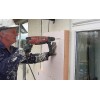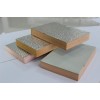我公司多年来专业致力于酚醛泡沫的研发生产,在酚醛泡沫的研发、生产、使用上积累了大量的经验,根据这些经验我们总结了酚醛泡沫的如下性能特点:
Our company has been dedicated to the research and development of phenolic foam for many years and accumulated a great deal of experience in the research, production and use ofphenolic foam. Based on these experiences, we summarized the following as performance characteristics of phenolic foam:
1极低的导热系数
酚醛泡沫的导热系数约为0.025w/(m.k),接近聚氨酯泡沫材料,优于挤塑板、聚苯板、岩棉、玻璃棉、泡沫玻璃、真金板等材料。而且我们公司还研发出了导热系数低于0.023w/(m.k)的酚醛泡沫保温板,应用于被动房可大大降低保温层的厚度。
1 Very low thermal conductivity
The thermal conductivity of Phenolic foam is
2良好的尺寸稳定性
酚醛泡沫属于热固性材料,无论在高低温(使用温度-250℃~150℃),还是长期使用后,尺寸稳定性都非常好。这点在外墙保温,尤其是薄抹灰系统中,显得尤为重要。
如果保温板尺寸稳定性不好,容易造成表面聚合物砂浆开裂以及保温板与聚合物砂浆脱层,最终导致外墙保温层脱落或屋面开裂渗水。
酚醛泡沫保温板的尺寸稳定性明显优于挤塑板、聚氨酯等材料。
2 good dimensional stability
Phenolic foam is thermosetting material, no matter in high and low temperature ( temperature range from -250 ℃to150℃) or long-termuse, the dimensional stability is very good. This is very
3优异的防火性能
酚醛泡沫生产时无需添加任何阻燃剂,氧指数大于40,高于一般的有机泡沫保温隔热材料。酚醛泡沫良好的防火性能表现在两方面:一是遇火不燃,仅遇火部分碳化,表面无滴落物、无卷曲、无熔化现象、不具有火焰传播性;二是遇火时发烟量低(最大烟密度(SDR)不超过5),而且由于无需添加阻燃剂,几乎无毒性烟气产生,所以发生火灾时也便于消防员救援。
经测试,25mm厚的酚醛泡沫板在经受1500℃的火焰喷射10min后,仅表面略有碳化却烧不穿,既不会着火更不会散发浓烟和毒气。
3 excellent fire resistance performance
Phenolic foam's production is without adding any flame retardant, oxygen index is more than 40, higher than the normal organic foam insulation materials. The good fire resistanceperformance of the phenolic foam shown in two ways: Firstly, don't ignite in case of fire, only partial carbonization, there is no dro on the surface , no curl, no melting, without flamespread; secondly, Low smoke (maximum smoke density (SDR)is no more than 5), and almost no toxic smoke generated due to no flame retardants added in the production, so it is alsoeasy for firefighters rescue given on a fire.
According to the testing, 25mm thick phenolic foam board under 1500 ℃flame spray for 10min, there is only a little carbonized on the surface but not burnedout, no flame and no toxic smoke.



4极低的热扩散系数
什么是热扩散系数?
以物体受热升温的情况为例来分析。在物体受热升温的非稳态导热过程中,进入物体的热量沿途不断地被吸收而使局部温度升高,在此过程持续到物体内部各点温度全部相同为止。也是材料传播温度变化能力大小的指标,因而有导温系数之称。
热扩散系数越小材料中温度变化传播得越缓慢。
4 Extremely low thermal diffusivity
What is thermal diffusivity?
Take the case of heating up the object as an example to analyze. In the heat transfer process, the heat entering the object is continuously absorbed along the way to make localtemperature rise, this process will be kept till the temperature inside the object are all the same. It is also the indicators which show the capacity of the material transit the temperature, thus called the thermal conductivity.
The smaller the thermal diffusivity, the slower the propagation of the temperature change in the material.
|
材料名称 |
密度(Kg/m3) |
导热系数(w/(m.k)) |
热扩散系数(10-7m2/s) |
|
岩棉 |
100 |
0.04 |
3.56 |
|
聚苯板 |
30 |
0.038 |
8.62 |
|
真金板 |
27 |
0.05 |
6.79 |
|
聚氨酯板 |
50 |
0.022 |
3.43 |
|
酚醛板 |
50 |
0.025 |
1.83 |
|
真空绝热板(短切丝芯材) |
200 |
0.002 |
0.09 |
(以上数值为我公司从清华大学热流体实验室订购的热扩散系数检测仪检测所得)
(The above values from the thermal diffusion coefficient detector ordered from Thermal Fluid Laboratory of Tsinghua University )
 (热扩散系数检测仪)
(热扩散系数检测仪)
如果保温隔热材料具有越低的热扩散系数,温度从一侧传递到另一侧需要更多的时间。所以对保温隔热材料而言,除了要求有较低的导热系数之外,也应该要求有较低的热扩散系数。因此,热扩散系数也是除导热系数之外,影响保温隔热材料实际应用效果的重要的参数指标。
If the thermal insulating material has a lower thermal diffusivity, it takes more time for the temperature to pass from one side to the other. Therefore, thermal insulationmaterials requires not only has a lower thermal conductivity, but also require a lower thermal diffusivity.
Therefore, the thermal diffusion coefficient is another
5耐老化,与建筑同寿命。
酚醛泡沫本身抗腐蚀抗老化,几乎能够耐所有无机酸、有机酸、有机溶剂的侵蚀,长期暴露于阳光下,其他无明显老化现象,具有较好的耐老化性。
而且经观察测试,外墙外保温薄抹灰系统中的酚醛泡沫保温板在自然现实环境中,其闭孔率和泡孔结构稳定,几乎没有变化。
上世纪90年代以来,酚醛泡沫就开始应用于英美等发达国家的建筑保温,良好的酚醛泡沫性能可以保证与建筑同寿命。
5 anti-aging, and same life period with the building
Phenolic foam itself is anti-corrosion and anti-aging, almost can against all inorganic acids, organic acids, organic so*ents erosion, long-term exposure to sunlight, no othersignificant aging, with good aging resistance.
After observing and testing, the phenolic foam insulation board applied in exterior wall thermal insulation thin plaster system has almost no change in its closed porosity andstabe cell structure in the natural environment.
Since 1990s, phenolic foam was used for building insulation in the United States and other developed countries, good phenolic foam performance can guarantee the same lifewith building.
 现场验证
现场验证




